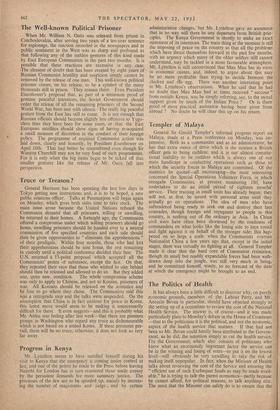The Well-known Political Prisoner
When Mr. William N. Oatis was released from prison in Czechoslovakia, after serving two years of a ten-year sentence for espionage, the reaction recorded in the newspapers and in public sentiment in the West was as sharp and profound as that following any of the sudden gestures of this kind made by East European Communists in the past two months. It is possible that these reactions are excessive in any case. The element of doubt that has been created by eight years of Russian Communist hostility and suspicion simply cannot be removed by the release of one man. This well-known political prisoner ceases, on his release, to be a symbol of the many thousands still in prison. They remain there. Even President Eisenhower's proposal that, as part of a minimum proof of genuine peaceful intentions, the Soviet Government should order the release of all the remaining prisoners of the Second World War, has been met with silence. The really big peaceful gesture from the East has still to come. It is not enough that Russian officials should become slightly less offensive to Yugo- slays than they have been for some years, or that the East European satellites should show signs of having re-acquired a small measure of discretion in the conduct of their foreign policy. The programme of required Communist action was laid down, clearly and honestly, by President Eisenhower on April 16th. That had better be remembered even though Sir Winston Churchill may not be very fond of such programmes. For it is only when the big items begin to 136 ticked off that smaller gestures like the release of Mr. Oatis fall into perspective.


































 Previous page
Previous page